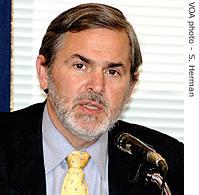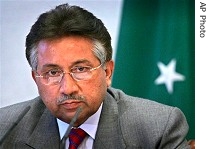2007年VOA标准英语-US Supports Pakistani Government Moves Against(在线收听)
State Department
17 July 2007
The Bush administration said Tuesday the United States is prepared to back Pakistani government actions against extremism with as a much as $1 billion in economic and military aid over the next several years. Much of the money would help Islamabad authorities assert control in lawless tribal areas bordering Afghanistan. VOA's David Gollust reports from the State Department.
 |
| Richard Boucher (file photo) |
The comments by Assistant Secretary of State for South and Central Asian Affairs Richard Boucher follow the Pakistani government's use of force earlier this month to end the long-running militant occupation of Islamabad's Red Mosque compound, and new pledges to drive al-Qaida and other foreign forces from the tribal areas.
Boucher, best known for his years as the State Department's chief spokesman, said the action at the Red Mosque shows the government of President Pervez Musharraf is prepared to move against what he termed a "dangerous militancy" that has come to "infect" various areas and parts of Pakistani society:
"Clearing out the mosque and the extremism there was a bold move, a decisive move," said Boucher. "It may have been a long time coming after a lot of provocation, but that I think reflects a certain concern about the women and children inside. But now having dealt with the mosque, it's pretty much, you know, crossing a line and there's no going back."
 |
| Pervez Musharraf (file photo) |
The assistant secretary said the Pakistani leader is now making tough choices to deal with al-Qaida and the Taleban in frontier provinces, while maintaining a commitment to political reform in the run-up to parliamentary elections later this year:
"He's shown the determination and the authority and the ability to deal with some of these very difficult situations," said Boucher. "He's also shown the determination to bring about the democratic transition that he understands, and we understand, is important to the long-term success of Pakistan as a moderate, modern Muslim nation. So we have no problems working with him."
Boucher said the United States plans to spend $750 million over five years on education, health and economic projects in the tribal areas in support of a Pakistani program to integrate the remote region into the national economy.
He said the Bush administration hopes to find an additional $300 million or more to help revamp the Pakistani army's 85,000-member Frontier Corps that patrols the border region.
Boucher said while civilian aid may offer the best long-term solution to combating the extremists, some are very violent and will probably have to be dealt with militarily.